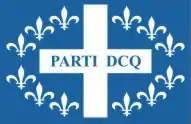Parti Unité Nationale
The Parti unité nationale (National Unity Party), formerly the Parti démocratie chrétienne du Québec (Christian Democracy Party of Quebec), is a social conservative political party in Quebec, Canada. It was founded in 2000 by Roman Catholics associated with the Centre d’Information nationale Robert Rumilly. The founding leader of the party was Gilles Noël.[1] The party's leader since 2010 has been Paul Biron, a retired engineer, whose brother, Rodrigue Biron, was leader of the conservative Union Nationale party from 1976 to 1980.[2]
Parti unité nationale | |
|---|---|
 | |
| Leader | Paul Biron |
| Founded | 2000 |
| Headquarters | Lévis, Quebec |
| Ideology | Christian democracy Social conservatism Quebec nationalism |
| Colours | Blue |
| Website | |
| www | |
| |
Its program is a combination of Christian orthodoxy and Quebec nationalism.[3] The party is concerned about the declining birth rate in Quebec, opposed to same-sex marriage and abortion, wants more support for families, and wider availability of Quebec-made consumer products.
The Parti démocratie chrétienne du Québec's 24 candidates won 3,575 votes in the April 2003 general election, or about 0.1% of the popular vote. It proposed to fight the aging of Quebec's population by favouring the family through the creation of a family benefit of $430 per month per child under the age of 18. The party also proposed eliminating the $5/day universal child care program offered by the Government of Quebec at the time.[4]
The party won 1,620 votes in the March 2007 general election, or about 0.04% of the popular vote.

On 29 June 2012 the Chief Electoral Officer of Quebec approved the name of the party to be changed to "Parti Unité Nationale".[5]
Party leaders
- Gilles Noël (2000-2005)
- Michel Bélanger (2005-2006) interim
- Gilles Noël (2006-2007)
- Albert Malcom Tremblay (2007-unknown)
- Michel Bélanger (2010)
- Paul Biron (since 21 December 2010)[5]
Election results
| General election | Candidates | Elected candidates | Popular vote |
|---|---|---|---|
| 2003 | 24 | 0 | 0.09% |
| 2007 | 12 | 0 | 0.04% |
| 2012 | 12 | 0 | 0.03% |
| 2014 | 3 | 0 | 0.00% |
References
- Le Devoir newspaper, April 12, 2003, "Le Parti Democratic Chretienne defended Les valeurs chretiennes"
- Patricia Cloutier, "Paul Biron: chef de parti... à 81 ans", Le Soleil, 1 April 2014
- Quebecpolitique.com
- Jeanne Corriveau, "Le parti Démocratie chrétienne du Québec - Défendre les valeurs chrétiennes", Le Devoir, 12 Avril 2003
- "Parti unité nationale". Le Directeur Général Des Élections du Québec. Retrieved 22 October 2015.